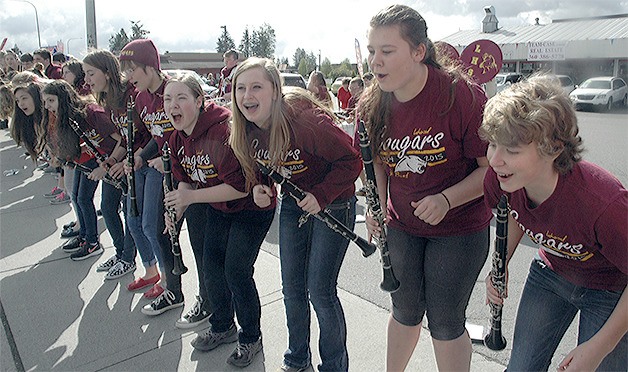LAKEWOOD — The teachers were on strike, but the band played on.
Members of the Lakewood High School marching band were among the nearly 60 students, teachers and community members who joined more than 130 Lakewood School District teachers April 22 on the 172nd Street overpass connecting Lakewood and Smokey Point.
LHS math teacher Larry Delaney, president of the Lakewood Education Association and teachers’ union, explained that their protest of the state legislature’s lack of support for basic education funding was only planned four weeks in advance.
“This didn’t come from the top down,” Delaney said. “This came from a small meeting in Bellingham. School districts from throughout the northwest portion of the state decided enough was enough, and voted overwhelmingly in favor of this strike.”
While Delaney acknowledged the negative impact on the students’ education for the day of the strike, he argued that it would have a positive impact on their education in the longer run.
“We need to show that we’re standing up for our kids and our profession, against these legislators and their poor educational policies,” Delaney said.
Although the Lakewood district is contractually obligated to take action against striking teachers, Delaney insisted this strike has the support of the district, citing a visit by superintendent Michael Mack earlier that morning.
“The district has shown they’re in favor of fully funded education and reduced classroom sizes, which affects not only our school districts, but those across the state,” Delaney said. “The community has really shown its support for us out here as well.”
The Lakewood teachers’ morning protest was followed by a march from Centennial Park to Legion Park, alongside Arlington and Stanwood teachers, that afternoon.
Jay Schilaty, a social studies teacher at Arlington High, pointed out that three of his four children are attending schools in the Arlington district.
“As soon as your first child is born, your life belongs to them,” said Schilaty, who argued the same was true of teachers. “You never hear a teacher refer to them as ‘my students.’ They’re always ‘my kids,’ because our professional lives belong to them. If this was just about how much teachers are paid, I wouldn’t even be here, but when what you do affects my kids, I’ve got to do something.”
AHS English teacher Kristi Larson asserted that the blame for the failures of the state educational system should be placed on inadequate funding and incorrect policies, rather than on teachers who are working with larger classes and limited resources.
“It has to be something serious to justify us walking out on our classes,” Larson said. “The state is shifting the problem rather than solving it.”
To Larson, larger classes mean less time she can spend with each student, which makes it more difficult for her to develop relationships with them, and catch those who might otherwise slip through the cracks.
Larson also objected to tying teacher evaluations to student performance on a new standardized test, calling it costly, cumbersome and redundant to existing evaluation standards.
“Are dentists judged by their patients’ flossing habits?” Larson said. “No, because there are too many other variables.”
Larson’s condemnation of the legislature for not spending enough per student was picked up by AHS senior Caroline Vogl, who reported that Washington ranks 43rd in per-pupil funding.
“By not doing what the voters, the laws and the courts have mandated, the legislature has failed our public schools, not the other way around,” Larson said.
Vogl cited how the time spent teaching to meet the needs of standardized tests has increasingly displaced the time spent on hands-on education, which she can attest from personal experience makes lessons come alive for students.
“Some students are being left behind, while others aren’t being challenged at all,” Vogl said. “It leaves students unhappy and reluctant to learn. Every year, they’re given less time and fewer resources, and they know it.”
As a member of the high school robotics team, Vogl has provided lessons in applied math and science to elementary and middle school students. But as schools devote more of their schedules to standardized tests, it becomes more difficult for her to give those lessons.
Post Middle School student body vice president Troy Roach Jr. praised his teachers for their commitment to their students, but pointed to larger class sizes as hindrances to personalized education.
“My science class is crowded, and my teacher tries her hardest —”
“Thank you, TJ!” a voice called out.
“But it doesn’t always work out,” Roach completed his thought. “It has to be frustrating for my teachers, who want to help us, but the time they have won’t allow it. They’re so selfless that they deserve more. It feels like the legislature thinks my education doesn’t matter.”
When Delaney addressed the crowd at the Legion Park gazebo, he was impressed with the turnout.
“The state is going to see this,” Delaney said. “We don’t have to wait on Seattle, or Tacoma, or Everett to take the first step. A wave is building, and in a few weeks, we’re going to look back and see how far it’s spread. I couldn’t be prouder that it started here.”







